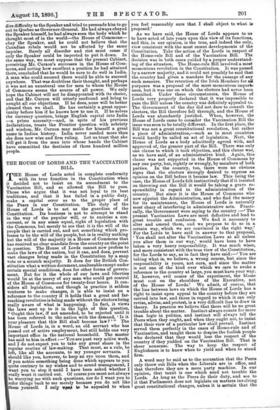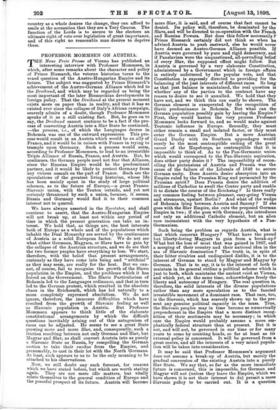THE HOUSE OF LORDS AND THE VACCINATION BILL. T HE House
of Lords acted in complete conformity with its true function in the Constitution when it decided not to insist on its amendment to the Vaccination Bill, and so allowed the Bill to pass. Those who argue that it was not loyal to its best traditions, and that it has failed in a public duty, make a capital error as to the proper place of the Peers in our Constitution. The duty of the House of Lords is to act as the guardian of the Constitution. Its business is not to attempt to stand in the way of the popular will, or to exercise a con- current, or in any sense equal, right of legislation with the Commons, but merely to see that it is the will of the people that is carried out, and not something which pro- fesses to be the will of the people, but is in reality nothing but the will of the majority in a House of Commons that has received no clear mandate from the country on the point in question. The House of Lords cannot now profess to make the laws of the nation, but it can, and does, prevent vast changes being made in the Constitution by a snap vote or a scratch majority. It does for the British Con- stitution what a written document, unalterable except under certain special conditions, does for other forms of govern- ment. But for it the whole of our laws and liberties would lie at the mercy of any man who could get control of the House of Commons for twenty-four hours. It con- siders all legislation, and though in practice it seldom ventures to make changes, it is able to insist on a reference to the country if it holds that a great and far- reaching revolution is being made without the electors being really aware of what is happening. In fact, it views the laws sent up to it in the light of this question, " Ought this law, if not amended, to be rejected until it has been referred to the nation with the demand, Is it your pleasure that this Bill shall become law ? ' " The House of Lords is, in a word, an old servant who has passed out of active employment, but still holds one very important office in the national household. The master has said to him in effect :—' You are past very active work, and I do not expect you to take any great share in the regular routine of law-making. That must, as a rule, be left, like all the accounts, to my younger servants. I should like you, however, to keep an eye upon them, and if you notice something being done which appears to you quite contrary to my wishes and to sound management, I want you to stop it until I have been asked whether I really want it carried out. Of course you must not always be worrying me with such questions, nor do I want you to refer things back to me merely because you do not like em yourself. I only wait to he appealed to when you feel reasonably sure that I shall object to what is proposed.'
As we have said, the House of Lords appears to us to have acted of late years upon this view of its functions, and this, in our opinion, is the true, and indeed the only, view consistent with the most recent developments of the Constitution. Take the action of the Lords in respect of the Home-rule Bill and of the Vaccination Bill. Tht decision was in both cases guided by a proper understand- ing of the situation. The Home-rule Bill involved a most momentous revolution in the Constitution. It was passed by a narrow majority, and it could not possibly be said that the country had given a mandate for the passage of any such measure. The retention of the Irish Members for all purposes was a proposal of the most momentous imports ance, but it was one on which the electors had never been consulted. Under these circumstances, the House of Lords very properly declared that it was impossible to pass the Bill unless the country was definitely appealed to. The Government of the day did not dare to consult the electors, the Bill therefore fell through, and the House of Lords was abundantly justified. When, however, the House of Lords came to consider the Vaccination Bill the issue was seen to be totally different. In the first place, the Bill was not a great constitutional revolution, but rathez a piece of administration,—such as in most countries would hardly be called an act of legislation. Next, the House of Lords as a body admittedly agreed with, and approved of, the greater part of the Bill. There was only one clause to which it took objection, and this clause was, as we have said, of an administrative kind. Again, this clause was not supported in the House of Commons by any one party, but, rightly or wrongly, by members of both parties. In the country, too, there were no obvious signs that the electors strongly desired to express an opinion on the Bill before it became law. This being the case, the House of Lords felt instinctively that if it insisted on throwing out the Bill it would be taking a grave re- sponsibility in regard to the administration of the country. But since it is the House of Commons who now appoint the Administration, and who find the money for its maintenance, the House of Lords is naturally most chary of interfering in administrative acts. Practi- cally, the Government were saying to the country The present Vaccination Laws are most defective and lead to great trouble and confusion. We find it necessary to. alter and amend them, and we propose to do so in a. certain way, which we are convinced is the right way.' For the Lords to have said in answer to that proposal, ' You shall not alter the Vaccination Laws at all unless you alter them in our way,' would have been to have taken a very heavy responsibility. It was much wiser, and more consistent with the true view of the Constitution, for the Lords to say, as in fact they have said:—' You are taking what is, we believe, a wrong course, but since the responsibility is yours, not ours, and since the matter is not one of the kind over which we care to evoke a reference to the country at large, you must have your way. If, however, evil comes of the experiment, the blame must rest on the shoulders of the Executive, not of the House of Lords.' We admit, of course, that the line between laws on which the House of Lords has a right to insist upon appeal to the country before they are carried into law, and those in regard to which it can only revise, advise, and protest, is a very difficult line to draw in theory. In practice we believe that there will be no great trouble about the matter. Instinct always counts for more than logic in politics, and instinct will always tell the Peers when they ought, and when they ought not, to insist that their view of a particular law shall prevail. Instinct served them perfectly in the cases of Home-rule and of Vaccination, and taught them to despise the foolish people who declared that they would lose the respect of the country if they yielded on the Vaccination Bill. That is sheer nonsense. The way to keep the respect of Englishmen is to know when to yield and when to stand firm.
A word may be said as to the accusation that the Peers only throw out Bills when the -Liberals are in office, and that therefore they are a mere party machine. In our opinion, that taunt is one which need not trouble the Lords. As long as the Peers do their duty, and see to it that Parliament does not legislate on matters involving great constitutional changes, unless it is certain that the country as a whole desires the change, they can afford to smile at the accusation that they are a Tory Caucus. The function of the Lords is to secure to the electors an ultimate right of veto over legislation of great importance, and of this right no reasonable man desires to deprive them.



































 Previous page
Previous page